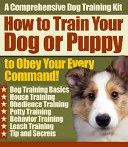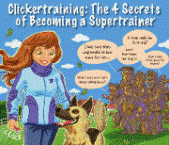Good Dog Training Advice
Get Fast & Simple Dog Training Tips to
Turn a Difficult Dog Into an Obedient Pet!
How to Housetrain a New Puppy
Pupplies love frolicking around your living room, bouncing between furniture and making everyone ooh and ahh. Then they decide they need to leave a little mess on the carpet and you all continue to ooh and ahh. Who can be mad at something so cute? It can be a lifelong struggle to get over that "he's so cute" reflex, but it is infinitely harder when they are fluffy and noseless and big eyed. But, this is the time to start laying down the laws - when a dog is most pliable, before it can actually cause damage. Dog training should be started almost immediately after you get your puppy - anytime from 8 weeks on. Most puppies will be at least 8 weeks old when you bring them home, so there is no excuse for putting it off. The Early Training... The first thing you'll want to do is to establish your training method. There are a few options here, including: * Crate Training - With crate training, you teach your puppy to sleep comfortably in his own private space. Start with an open crate full of toys and comfortable blankets. The puppy will go in on his own and eventually claim it for his den. Make sure the crate is not too big, because you want him not to make a mess in there. Dogs instinctively avoid going to the bathroom in their crates, so this works to your advantage. It also teaches your puppy that he can hold his bladder and bowels instead of going immediately. * Pad Training - Puppy training pads are squares of absorbent cloths (newspapers work as well) that you will lay out on the floor in a closed space. You may want to have a gate to keep him in the space as well. You'll need to watch the puppy like a hawk and whenever you see the mess making behaviours - sniffing, turning, pawing at the ground - you should immediately move him to the pads. It will only take a couple times to teach him that he must pee there. * Outdoors - You can graduate from paper training your puppies to outdoor training or simply start with it. In this case, you'll need to have quick access to the outdoors. Whenever the puppy starts to ready for a pee or poop, take them outside and let them do it outside. This one is hard because it takes a long time to set up and requires constant vigilance, but it will work much faster because of the associations and smells of the outdoors. The number one thing you should always remember, whichever training method you use, is to never punish your puppy for a mess. Your dog could be the worst potty trainer in history, but the second you start yelling or rubbing their nose in it, you only confuse them. A dog does not want to make a mess in its den. Instinctively they avoid it for health and protection reasons - they don't want other animals tracking them back to where they sleep. As pack leader, it is your responsibility to make them understand that the house is their home. If they have trouble learning this early on, make their territory smaller. Reduce the amount of room they have in the house with a crate or a gate. You also need to be willing to work with them, watching constantly for instances in which you may need to interject and stop a mess from being made. It's no secret that dog house training can be a little tough, but if you show patience, help you dog along the way, and never get angry it will go by much faster. ======================================================= For the Ultimate Guide to Housetraining Your Puppy, see: http://gooddogtrainingadvice.com/housetraining.html If your dog is no longer a puppy, yet needs house- training, then you'll want to get a copy of "How to Train Your Dog or Puppy": http://ebook.gooddogtrainingadvice.com ======================================================= | |
|


Discover the Secrets to Training Your Dog Or Puppy. Huge BONUSES for a limited time only!
Click here now...
|
http://GoodDogTrainingAdvice.com




